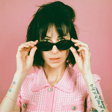
Ilya Popenko
Ilya Popenko is a multi-disciplinary artist who was born in the Soviet Union and immigrated to the US at the age of 16. He is an award-winning filmmaker and photographer as well as a songwriter and a performer. In 2011, he formed a band called Mad Meg who play in an eclectic style they themselves haphazardly identify as “Punk-Chanson-Noir”. Based out of New York, Mad Meg has toured extensively in Russia and the former Soviet Bloc, including tours that covered close to 30 cities throughout the vast, frozen expanse of Eastern Europe, and in the course of which they shared the stage with such luminaries as Nogu Svelo!, Rasputina, and Emir Kusturica and recorded a live album in a female prison in Lithuania. While Mad Meg is on hiatus, Ilya works on his solo songs, one of which he’s proud to present today.



















